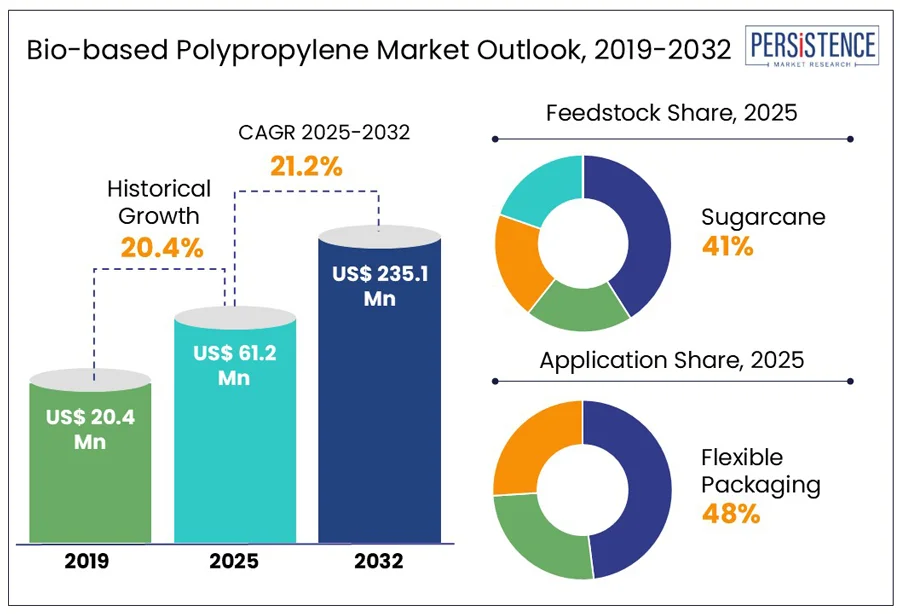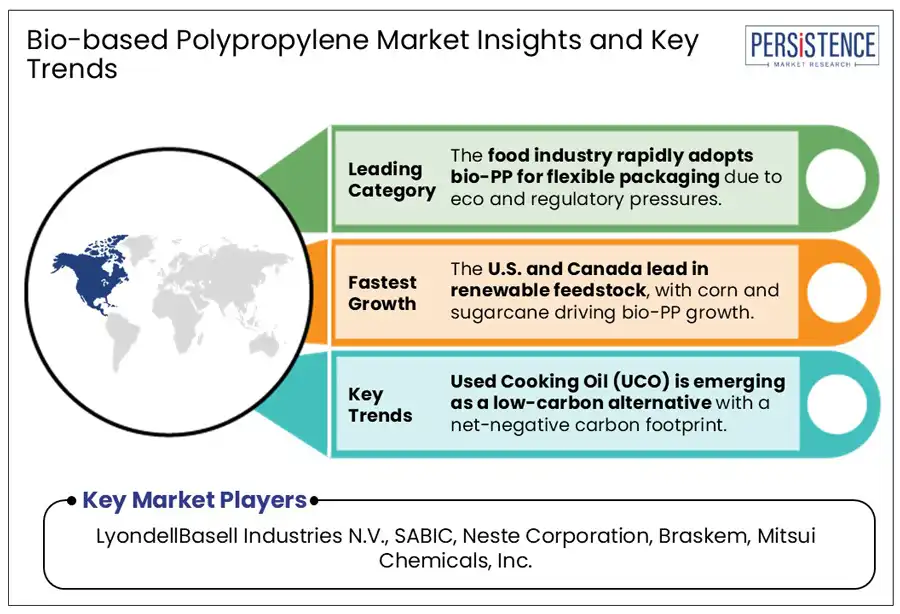ID: PMRREP4366| 190 Pages | 3 Jun 2025 | Format: PDF, Excel, PPT* | Chemicals and Materials

The global bio-based polypropylene market size is anticipated to rise from US$ 61.2 Mn in 2025 to US$ 235.1 Mn by 2032. It is projected to witness a CAGR of 21.2% from 2025 to 2032. According to the Persistence Market Research report, the bio-based polypropylene (Bio-PP) market is set for significant growth as industries seek sustainable alternatives to conventional plastics. Made from renewable sources, Bio-PP offers mechanical properties similar to those of traditional polypropylene (PP). A study by Sini Kivisaari found that PP has a carbon footprint of about 1.7 kg CO? equivalents per kg, while Bio-PP (UCO-based) has a much lower footprint of 0.80 kg, reducing emissions by 53%.

Key Industry Highlights:
|
Global Market Attribute |
Key Insights |
|
Bio-based Polypropylene Market Size (2025E) |
US$ 61.2 Mn |
|
Market Value Forecast (2032F) |
US$ 235.1 Mn |
|
Projected Growth (CAGR 2025 to 2032) |
21.2% |
|
Historical Market Growth (CAGR 2019 to 2024) |
20.1% |
PE and PP are widely used plastics worldwide for consumer goods and industrial uses. The increasing global focus on reducing the carbon footprint of fossil-based plastics is a major factor driving the demand for bio-based polypropylene (Bio-PP). PP accounts for more than 20% of plastic produced global plastic production. The carbon footprint of PP is reported to range between 1.4-3.5 kg CO2 per kg of plastic produced.
Manufacturers are investing in sustainable alternatives, such as bio-based polypropylene (bio-PP), made from renewable sources such as corn and sugarcane. Bio-PP has a lower carbon footprint and reduced greenhouse gas emissions, making it a viable solution for industries seeking durable and versatile low-emission materials.
FKuR has introduced Terralene® PP 3509, a bio-based compound with about 33% renewable raw materials. Approved for food packaging, it also offers excellent properties for various industries.
The expansion of bio-based polypropylene manufacturing plants faces major obstacles due to the scarcity of raw resources. Bio-PP is made mostly from renewable feedstocks such as sugarcane, corn, used cooking oil (UCO), and vegetable oils. These resources are also in high demand for biofuels, food production, and other biopolymers, leading to supply chain constraints and price volatility.
Unlike conventional polypropylene, which benefits from established petrochemical supply networks, the production of bio-PP requires additional investment in sourcing feedstock and developing processing infrastructure. This increased investment affects the price of bio-PP, making it approximately 20-30% more expensive than traditional plastics. Additionally, the cost of biodegradable plastics is generally higher compared to conventional plastics.
The automotive industry's transition to sustainability presents a considerable opportunity for the use of bio-based polypropylene. Bio-PP, which is made from renewable resources, performs similarly to traditional polypropylene while having a lower environmental impact. The use of Bio-PP not only improves vehicle sustainability but also addresses the growing customer demand for environmentally friendly products. This shift promotes a circular economy and establishes Bio-PP as an important material for the future of sustainable vehicle manufacture.
Braskem and Mazda are pioneering the use of Bio-PP from cellulosic biomass in automotive parts such as bumpers and interiors, marking a significant shift towards sustainability in the industry.
Food industry is witnessing a rapid move towards bio-pp for flexible packaging owing to environmental concerns and regulatory constraints. Bio- PP has the same durability, heat resistance, and moisture barrier properties as traditional polypropylene, but with lower carbon footprint.
With the growing customer demand for environmentally responsible packaging, food makers and brands are adding Bio-PP into snack wrappers, food pouches, films, and resealable bags. Taghleef Industries has introduced bio-based polypropylene films for flexible packaging, labeling, and graphic arts. These Bio-PP films match the technical performance and machinability of traditional fossil-based polypropylene films.
In 2024, FKuR, a specialist in bioplastics, launched its Bio-Flex® range for food packaging. These biodegradable and compostable plastics are naturally breathable, allowing greater permeability to oxygen and water vapor than conventional fossil-based plastics, such as polyethylene or polypropylene.

North America is one of the largest producers of renewable feedstock, particularly the U.S and Canada. The abundance of sugarcane and corn plays an important role in evolution of bio-pp market. In 2024, the US produced over 34.8 million tons of sugarcane, while Brazil produced over 45.5 million tons as the largest producer. The dominance of these regions worldwide plays crucial role in providing a stable raw material supply chain. Additionally, key players in the region, including Braskem, LyondellBasell Industries N.V., and Danimer Scientific, are expanding their bio-polymer manufacturing capabilities to cater to industries like packaging, automotive, and consumer goods.
The bio-based polypropylene market in Europe is driven by strict environmental regulations and sustainability goals. The European Union's Green Deal aims for climate neutrality by 2050, with the Circular Economy Action Plan focusing on reducing waste and promoting resource reuse. The EU has strongly supported developing bio-based plastics through ambitious and collaborative research under the Horizon 2020 research and innovation program.
These initiatives are expected to lower plastic waste and carbon emissions, fostering a supportive environment for bio-based alternatives. Major corporations such as Borealis AG, Neste, and TotalEnergies Corbion are investing in bio-polymer production and R&D to increase the commercial feasibility of Bio-PP. With increasing customer demand for environmentally friendly products, Europe is likely to witness a huge growth in the worldwide bio-based polypropylene market in the upcoming years.
The global bio-based polypropylene market is becoming gradually competitive as large petrochemical players are expanding their portfolios by integrating bio-based alternatives while new entrants are concentrating on specialized production methods and niche applications. Regional players are leveraging government incentives and regulations to gain a foothold in emerging markets, while global firms focus on supply chain optimization and carbon footprint reduction.
The industry is characterized by strategic partnerships, collaborations, and investments in research and development (R&D) to enhance production efficiency and scalability. The rising demand for sustainable plastics in automotive, packaging, and consumer goods sectors is intensifying competition, making innovation, cost efficiency, and regulatory compliance crucial for success in the bio-based polypropylene market.
The market is set to reach US$ 61.2 Mn in 2025.
Flexible Packaging is the fastest growing application for bio-based polypropylene.
LyondellBasell Industries N.V., SABIC, Neste Corporation are a few leading players.
The industry is estimated to rise at a CAGR of 21.2% through 2032.
Europe is projected to hold the largest share of the industry in 2025.
|
Report Attribute |
Details |
|
Historical Data/Actuals |
2019 - 2024 |
|
Forecast Period |
2025 - 2032 |
|
Market Analysis Units |
Value: US$ Mn, Volume: As applicable |
|
Geographical Coverage |
|
|
Segmental Coverage |
|
|
Competitive Analysis |
|
|
Report Highlights |
|
|
Customization and Pricing |
Available upon request |
By Feedstock
By Application
By Region
Delivery Timelines
For more information on this report and its delivery timelines please get in touch with our sales team.
About Author